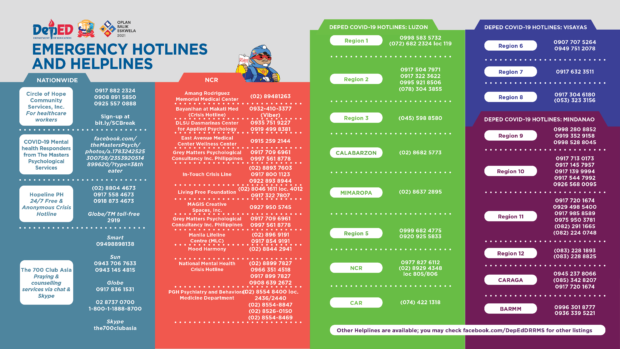DepEd launches mental health helpline for students, teachers
MANILA, Philippines — When their children exhibit aggressive or antisocial behavior, parents may think they are just being rude.
But this characteristic may be an indicator that their kids are struggling with issues that affect their mental health in the midst of the COVID-19 pandemic, according to an official from the Department of Education (DepEd).
“Sometimes the parents would perceive it as disrespectful and even scold them. Let’s take a pause because this could be a manifestation that the children are going through difficult times,” Ronilda Co, the director of DepEd’s Disaster Risk Reduction and Management Service (DRRMS), told the Inquirer.
Other indicators that they are having mental health problems, Co said, are isolating one’s self, experiencing nightmares, having trouble sleeping or concentrating, and irritability. There may also be physical manifestations such as hyperventilation and other breathing problems. Co cited other signs to watch out for such as confusion and sadness that, if unaddressed, could worsen and lead to suicidal thoughts.
“We need to look out for these manifestations so that we know when to help and talk to the kids,” she said.
Psychological distress
In an effort to help students in the basic and secondary levels cope with disruptions in the education system resulting from the COVID-19 pandemic, the DepEd has launched various initiatives, including boosting its mental health helpline system.
Through the helpline system, learners, teachers, and the general public can get in touch with various health organizations all over the country that can help them deal with mental and psychological distress.
Responders manning the hotlines can talk to the learners and assess if they need a referral to mental health experts like psychologists or psychiatrists.
In addition, DepEd personnel from the regional offices may also visit affected students at home to find out more about their situation to better understand it.
Co said the biggest challenge learners were facing was the modular method of distance learning. Under the current setup, students find it difficult to balance their academic workload and household responsibilities.
The loss of human interaction as they remain cooped up inside their houses in addition to problems their parents are dealing with can also contribute to their distress.
“Some parents have lost their jobs, especially the breadwinners, and they are having a hard time managing the experience. So it really spills over to the kids,” Co said.
Tala TV series
Aside from the helpline system, the DepEd has offered psychosocial support services for elementary learners through a television series titled “Tuklasin, Alamin, Likhain at Alalahanin” or Tala. It has music, storytelling segments and art activities intended to “ensure the proper development of children’s social emotional learning.”
Airing on DepEd TV every Saturday at 7 a.m., Tala also gives pointers for parents to identify and recognize their kids’ emotions and strengths and help build their self-esteem.
On the other hand, secondary learners can take part in the OKKK! Tambayan (Online Kahusayan at Katatagan ng Kabataan) initiative where there are focus group discussions.
“We give them space to actually interact with mental health experts who are our resource persons on a weekly basis,” Co said.
There are also programs to help students with disabilities, she said, noting that they are looking at establishing specific psychosocial supports for learners in Muslim and indigenous peoples groups.
Teachers not left behind
For teachers and school personnel, there are seminars and capacity-building initiatives to make sure their mental health needs are addressed as well.
Co said that every Wednesday, there are small group “kamustahan” and sessions for teachers all over the country “to provide them the anchor in handling and continuously managing what they are experiencing.”
In July last year, the DepEd also introduced the “Gabay Bahay” project to help empower parents and caregivers as they provide guidance and support to their children amid the pandemic.
“Our ultimate goal is to hopefully, eventually, [the students] will not only be able to cope or manage but also thrive in this difficult situation. If we are able to do that, we can be proud and say that we have attained resiliency.” Co said.
